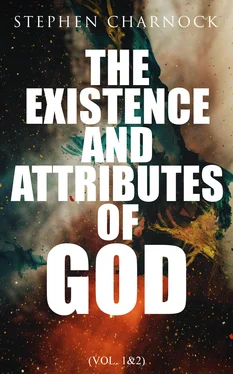Stephen Charnock - The Existence and Attributes of God (Vol. 1&2)
Здесь есть возможность читать онлайн «Stephen Charnock - The Existence and Attributes of God (Vol. 1&2)» — ознакомительный отрывок электронной книги совершенно бесплатно, а после прочтения отрывка купить полную версию. В некоторых случаях можно слушать аудио, скачать через торрент в формате fb2 и присутствует краткое содержание. Жанр: unrecognised, на английском языке. Описание произведения, (предисловие) а так же отзывы посетителей доступны на портале библиотеки ЛибКат.
- Название:The Existence and Attributes of God (Vol. 1&2)
- Автор:
- Жанр:
- Год:неизвестен
- ISBN:нет данных
- Рейтинг книги:3 / 5. Голосов: 1
-
Избранное:Добавить в избранное
- Отзывы:
-
Ваша оценка:
- 60
- 1
- 2
- 3
- 4
- 5
The Existence and Attributes of God (Vol. 1&2): краткое содержание, описание и аннотация
Предлагаем к чтению аннотацию, описание, краткое содержание или предисловие (зависит от того, что написал сам автор книги «The Existence and Attributes of God (Vol. 1&2)»). Если вы не нашли необходимую информацию о книге — напишите в комментариях, мы постараемся отыскать её.
The Existence and Attributes of God (Vol. 1&2) — читать онлайн ознакомительный отрывок
Ниже представлен текст книги, разбитый по страницам. Система сохранения места последней прочитанной страницы, позволяет с удобством читать онлайн бесплатно книгу «The Existence and Attributes of God (Vol. 1&2)», без необходимости каждый раз заново искать на чём Вы остановились. Поставьте закладку, и сможете в любой момент перейти на страницу, на которой закончили чтение.
Интервал:
Закладка:
But thou hast in this book, not only an excellent subject in the general, but great variety of matter for the employment of thy understanding, as well as enlivening thy affections, and that, too, such as thou wilt not find elsewhere: many excellent things which are out of the road of ordinary preachers and writers, and which may be grateful to the curious, no less than satisfactory to the wise and judicious. It is not, therefore, a book to be played with or slept over, but read with the most intent and serious mind; for though it afford much pleasure for the fancy, yet much more work for the heart, and hath, indeed, enough in it to busy all the faculties. The dress is complete and decent, yet not garish nor theatrical; the rhetoric masculine and vigorous, such as became a pulpit, and was never borrowed from the stage; the expressions full, clear, apt, and such as are best suited to the weightiness and spirituality of the truths here delivered. It is plain he was no empty preacher, but was more for sense than sound, filled up his words with matter, and chose rather to inform his hearers’ minds than to claw any itching ears. Yet we will not say but some little things, a word, or a phrase now and then he may have, which, no doubt, had he lived to transcribe his own sermons, he would have altered. If in some lesser matters he differ from thee, it is but in such as godly and learned men do frequently, and may, without breach of charity, differ in among themselves: in some things he may differ from us too, and, it may be, we from each other; and where are there any two persons who have in all, especially the more disputable points of religion, exactly the same sentiments,—at least, express themselves altogether in the same terms? But this we must say, that though he treat of many of the most abstruse and mysterious doctrines of Christianity, which are the subjects of great debates and controversies in the world, yet we find no one material thing in which he may justly be called heterodox (unless old heresies be of late grown orthodox, and his differing from them must make him faulty), but generally delivers, as in his former pieces, 5what is most consonant to the faith of this and other, the best reformed churches. He was not, indeed, for that modern divinity which is so much in vogue with some who would be counted the only sound divines; having “tasted the old,” he did not desire “the new,” but said, “the old is better.” Some errors, especially the Socinian, he sets himself industriously against, and cuts the very sinews of them, yet sometimes almost without naming them.
In the doctrinal part of several of his discourses thou wilt find the depth of polemical divinity, and in his inferences from thence, the sweetness of practical ; some things which may exercise the profoundest scholar, and others which may instruct and edify the weakest Christian. Nothing is more nervous than his reasonings, and nothing more affecting than his applications. Though he make great use of schoolmen, yet they are certainly more beholden to him than he to them; he adopts their notions, but he refines them too, and improves them and reforms them from the barbarousness in which they were expressed, and dresseth them up in his own language (so far as the nature of the matter will permit, and more clear terms are to be found), and so makes them intelligible to vulgar capacities, which, in their original rudeness, were obscure and strange even to learned heads.
In a word, he handles the great truths of the gospel with that perspicuity, gravity, and majesty, which best becomes the oracles of God; and we have reason to believe, that no judicious and unbiassed reader but will acknowledge this to be incomparably the best practical treatise the world ever saw in English upon this subject. What Dr. Jackson did, to whom our author gave all due respect, was more brief and in another way. Dr. Preston did worthily upon the Attributes in his day; but his discourses likewise, are more succinct, when this author’s are more full and large. But whatever were the mind of God in it, it was not his will that either of these two should live to finish what he had begun, both being taken away when preaching upon this subject. Happy souls! whose last breath was spent in so noble a work, praising God while they had any being (Psal. cxlvi. 2).
His method is much the same in most of these discourses, both in the doctrinal and practical part, which will make the whole more plain and facile to ordinary readers. He rarely makes objections, and yet frequently answers them, by implying them in those propositions he lays down for the clearing up the truths he asserts. His dexterity is admirable in the applicatory work, where he not only brings down the highest doctrines to the lowest capacities, but collects great variety of proper, pertinent, useful, and yet, many times, unthought‑of inferences, and that from those truths, which however they afford much matter for inquisition and speculation, yet might seem, unless to the most intelligent and judicious Christians, to have a more remote influence upon practice. He is not like some school writers, who attenuate and rarefy the matter they discourse of to a degree bordering upon annihilation, at least, beat it so thin, that a puff of breath may blow it away; spin their thread so fine, that the cloth, when made up, proves useless, solidity dwindles into niceties, and what we thought we had got by their assertions, we lose by their distinctions. But if our author have some subtilties and superfine notions in his argumentations, yet he condenseth them again, and consolidates them into substantial and profitable corollaries in his applications; and in them his main business is, as to discipline a profane world for its neglect of God, and contempt of him in his most adorable and shining perfections, so likewise to show how the Divine Attributes are not only infinitely excellent in themselves, but a grand foundation for all true divine worship, and should be the great motives to provoke men to the exercise of faith, and love, and fear, and humility, and all that holy obedience they are called to by the gospel; and this, without peradventure, is the great end of all those rich discoveries God hath in his word made of himself to us. And, reader, if these elaborate discourses of this holy man, through the Lord’s blessing, become a means of promoting holiness in thee, and stir thee up to love and live to the God of his praise (Ps. cix. 1), we are well assured that his end in preaching them is answered, and so is ours in publishing them.
Thine in the Lord,
Edw. Veel.
Ri. Adams.
DISCOURSE I.
ON THE EXISTENCE OF GOD.
Table of Contents
Psalm xiv. 1.—The fool hath said in his heart, There is no God. They are corrupt, they have done abominable works, there is none that doeth good.
This psalm is a description of the deplorable corruption by nature of every son of Adam, since the withering of that common root. Some restrain it to the Gentiles, as a wilderness full of briers and thorns, as not concerning the Jews, the garden of God, planted by his grace, and watered by the dew of heaven. But the apostle, the best interpreter, rectifies this in extending it by name to Jews, as well as Gentiles, (Rom. iii. 9). “We have before proved both Jews and Gentiles, that they are all under sin;” and (ver. 10–12) cites part of this psalm and other passages of scripture for the further evidence of it, concluding by Jews and Gentiles, every person in the world naturally in this state of corruption.
The psalmist first declares the corruption of the faculties of the soul, The fool hath said in his heart; secondly, the streams issuing from thence, they are corrupt, &c.: the first in atheistical principles, the other in unworthy practice; and lays all the evil, tyranny, lust, and persecutions by men, (as if the world were only for their sake) upon the neglects of God, and the atheism cherished in their hearts.
Читать дальшеИнтервал:
Закладка:
Похожие книги на «The Existence and Attributes of God (Vol. 1&2)»
Представляем Вашему вниманию похожие книги на «The Existence and Attributes of God (Vol. 1&2)» списком для выбора. Мы отобрали схожую по названию и смыслу литературу в надежде предоставить читателям больше вариантов отыскать новые, интересные, ещё непрочитанные произведения.
Обсуждение, отзывы о книге «The Existence and Attributes of God (Vol. 1&2)» и просто собственные мнения читателей. Оставьте ваши комментарии, напишите, что Вы думаете о произведении, его смысле или главных героях. Укажите что конкретно понравилось, а что нет, и почему Вы так считаете.












